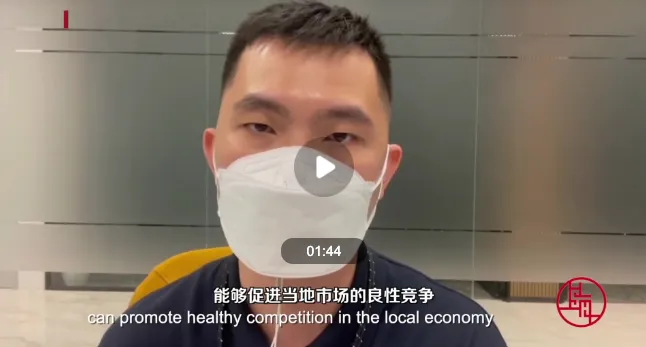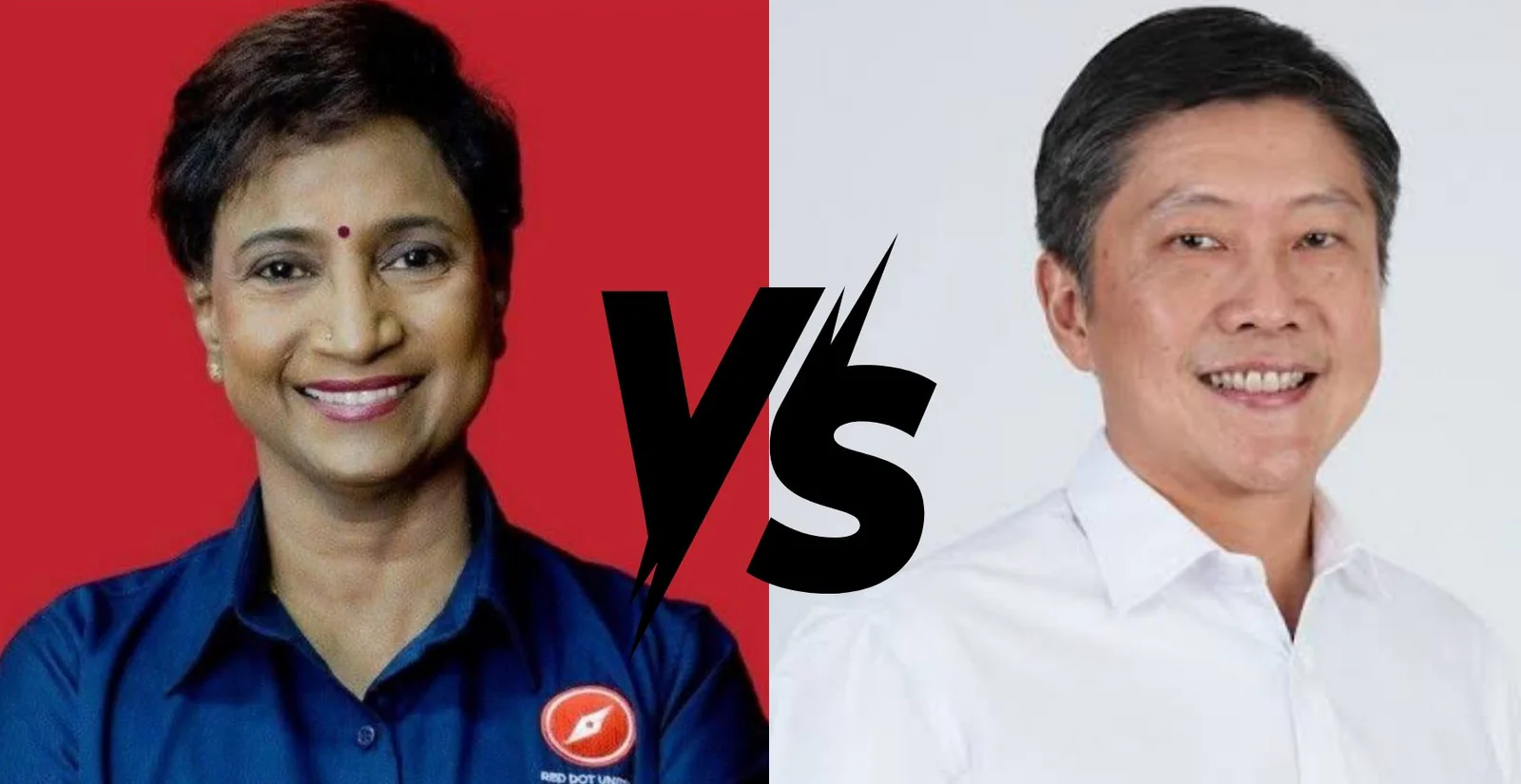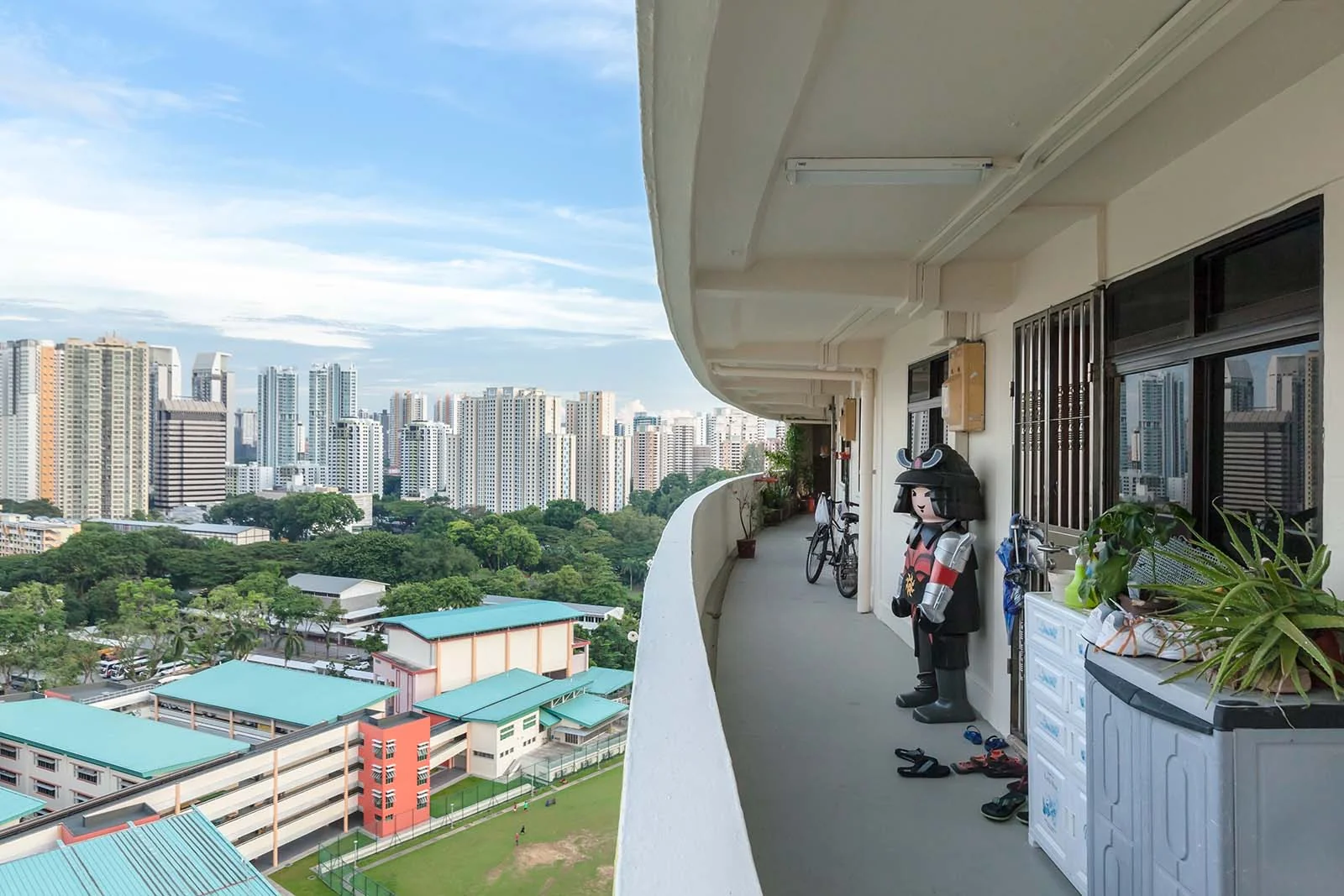孔祥庆:新加坡是许多中国公司“出海”的首选地,中国企业也带动了当地良性竞争
老外讲故事·海外员工看中国

老外讲故事·海外员工看中国

In Jalan Kayu SMC, it's not about picking a winner, but rather, who is the sturdier of two Kayus.

29,564 voters in Jalan Kayu SMC will likely have to choose between two kayus come May 3, 2025: Ng Chee Meng, the People's Action Party's NTUC chief tainted by the 2024 Allianz-Income debacle, and Kala Manickam, Red Dot United's (RDU) combative educator whose 2021 PSP lawsuit reveals a divisive streak.
Ng Chee Meng, 56, served as Chief of Air Force (2009–2013) and Chief of Defence Force (2013–2015) in the Singapore Armed Forces.
Entering politics with the People’s Action Party (PAP) in 2015, he won Pasir Ris–Punggol GRC but lost Sengkang GRC in 2020 (47.88% votes).
As NTUC Secretary-General since 2018, Ng has championed workforce development and workers' rights. Yet, his endorsement of the 2024 Allianz-Income deal, marred by a S$1.85 billion capital extraction and transparency lapses, paints him as either complicit in prioritizing profits or negligent in oversight.
Kala Manickam, 57, is a relatable yet polarizing opposition candidate, bringing a mix of grassroots appeal and contentious history.
A single mother, specialist educator, and SME owner, she holds a Master’s in Lifelong Learning and was a pioneer female officer in the Singapore Armed Forces, serving seven years as a lieutenant.
Kala's 2020 run in Nee Soon GRC with the Progress Singapore Party (PSP) yielded 38.76% of votes, but her expulsion from PSP in December 2020 led to a 2021 lawsuit alleging wrongful termination. The lawsuit was later settled amicably but revealed a divisive streak through accusations of insubordination and solo campaigning.
Now with Red Dot United (RDU), Kala is the likely candidate for Jalan Kayu SMC, advocating for job retraining and cost-of-living relief.
In July 2024, NTUC and Allianz proposed a S$2.2 billion acquisition deal to bolster NTUC Income's competitiveness.
In an August 2024 statement with NTUC President K Thanaletchimi, he endorsed the deal, assuring that Allianz would honor Income’s social mission and existing policies.
But the devil was in the details: a S$1.85 billion capital extraction plan would have seen Allianz recoup nearly half its investment, potentially draining reserves meant to keep premiums low.
The Singapore government, led by Minister Edwin Tong, blocked the deal on October 14, 2024, citing its clash with Income’s 2022 corporatization goal of building financial strength for policyholders.
As NTUC Enterprise board member and NTUC chief, Ng’s claim that the central committee was unaware of the capital extraction plan until disclosure is damning.
Yet, the capital extraction plan—described by former Income CEO Tan Suee Chieh as a “breach of good faith”—contradicted this.
Ng’s claim of acting in “good faith” rings hollow when his dual roles as NTUC leader and NTUC Enterprise board member placed him at the heart of decision-making.
If Ng knew about the extraction and supported it, he’s complicit in prioritizing profits over people.
If he didn’t know, as he claims, he’s guilty of negligence—a damning indictment for a former Chief of Defence Force who built his career on precision and accountability.
SMU’s Eugene Tan called this ignorance “mind-boggling".
This isn’t Ng’s first misstep.
In January 2025, he attributed job insecurity to AI, ignoring netizens’ concerns over foreign manpower policies, alienating workers facing stagnant wages and sparked backlash for misreading ground sentiments..
His 2020 Sengkang GRC loss (47.88% vote share) already marks him as vulnerable.
Ng’s military pedigree and NTUC role are assets, but the Allianz saga reveals a leader either too cozy with corporate interests or too lax to notice their overreach.
His inability to anticipate public outrage—or even know the deal’s terms—undermines his claim to represent workers.
Jalan Kayu’s voters, wary of PAP’s perceived elitism, may question whether Ng prioritizes their needs or the party line. His campaign’s reliance on PAP machinery, despite his “own merits” rhetoric, risks reinforcing this skepticism.
In July 2021, Kala sued PSP in the High Court (later transferred to State Courts), seeking a declaration that her December 2020 termination was “wrongful and invalid” and a S$10,000 refund for election expenses (e.g., fliers, pamphlets).
She argued PSP violated its constitution and due process, claiming she was not informed of specific charges, given no chance to defend herself, and unaware of investigation outcomes.
PSP’s seven affidavits, including from Tan Cheng Bock, painted her as “disruptive” and “insubordinate,” bullying teammates, and undermining cohesion.
Kala's fellow Nee Soon GRC candidate Damien Tay described her as putting her self-interests ahead of the team, during the run-up to the elections. He and candidate Taufik Supan cited how she "went about doing her own things", such as going on solo walkabouts, skipping team meetings and amassing a volunteer pool for herself.
A 17-member petition - including Kala's own election agent - and 55-to-11 cadre vote against her reinstatement bolstered PSP’s case.
Tan Cheng Bock pointed to a November 2020 meeting in where she was confrontational, as if "raring for a fight"; and "aggressively questioned… proof of her wrongdoings by shouting: 'WHAT PROOF? WHAT PROOF?'".
Kala’s public airing of grievances—via Facebook and court—signals a principled stand but also a divisive style.
Her actions suggest a lone-wolf mentality, ill-suited for Singapore’s collaborative politics.
Her move to Red Dot United (RDU), a smaller party, looks opportunistic, especially after RDU chief Ravi Philemon’s own PSP exit.
Kala’s SAF and educator roles show leadership, but her PSP fallout reveals a failure to build alliances.
Ng benefits from PAP’s ground game and Jalan Kayu’s Ang Mo Kio roots, but his Allianz misstep and Sengkang loss make him vulnerable.
Kala’s relatable story and opposition unity give her an edge, but her PSP saga and lesser-known status limit her reach.
The Workers’ Party’s absence (no confirmed candidate) and People's Power Party potential entry could complicate vote splits, though RDU’s coordination mitigates this.
In Jalan Kayu SMC, it's not about picking a winner, but rather, who is the sturdier of two kayus.
黄志明与卡拉·马尼卡姆的对决揭示信任与分裂的较量

2025年5月3日,Jalan Kayu单选区(Jalan Kayu SMC)的29,565名选民将站在十字路口,选择两条崎岖路径之一:人民行动党(PAP)职总秘书长黄志明,背负2024年职总英康收购案的污点,宛如一辆伤痕累累的战车;抑或红点团结党(RDU)的激进教育家卡拉·马尼卡姆,其2021年前进党诉讼风波暴露的个人主义倾向,恰似一艘独木舟在政治风浪中摇摆 [译注:2025年4月22日,红点团结党宣布退出Jalan Kayu单选区,支持工人党参选,以避免多角竞争。本文基于此前候选人假设撰写]。
黄志明曾于2009至2013年担任新加坡空军总长,2013至2015年升任三军总长,展现军事生涯的严谨与权威。2015年,他代表人民行动党当选巴西立-榜鹅集选区国会议员,但在2020年竞逐盛港集选区时,以47.88%的得票率铩羽而归。自2018年起,他担任职总秘书长,力推劳动力发展和工人权益政策,试图为职场注入活力。然而,2024年职总英康收购案令其公信力蒙尘,被舆论抨击“要么纵容利益输送,要么严重失职”,如同一座信任堡垒被风暴侵蚀。
卡拉·马尼卡姆是单亲母亲、特殊教育专家兼中小企业主,拥有终身教育硕士学位,散发草根魅力。她是新加坡武装部队首批女军官之一,服役七年,官至中尉,彰显坚韧。2020年,她代表前进党竞选义顺集选区,获38.76%选票;同年12月被开除,2021年提起“不当终止党籍”诉讼,后和解。此事暴露其“独行侠”作风。如今,她加入红点团结党,聚焦职业培训和生活成本压力,试图以小党之力撬动选民心弦。
2024年7月,职总与德国保险巨头英杰华(Allianz)提出22亿新元的收购案,宣称将增强职总英康的竞争力。8月,黄志明与职总主席达纳拉克希米发表联合声明,信誓旦旦保证英杰华将维护英康的社会使命。然而,细节如暗礁般浮现,险些葬送交易。英杰华计划提取18.5亿新元资本,近半投资可迅速回笼,恐耗尽维持低保费的储备金,宛如从社会保障的根基抽梁换柱。2024年10月14日,文化、社区及青年部长唐振辉代表政府果断叫停交易,认定其背离英康2022年公司化目标,即强化财务实力以惠及保单持有人。
黄志明坚称职总中央委员会对资本提取计划毫不知情,试图撇清责任,但前英康首席执行官陈瑞财痛斥该计划“违背诚信”,直指交易暗藏私利。新加坡管理大学副教授陈庆文直言,这种无知“令人瞠目结舌” [译注:意指难以置信的疏忽],如同指挥官在战场上迷失方向。2025年1月,黄志明将就业不稳定性归咎于人工智能,回避外籍劳工政策争议,被批“高高在上”,如同一座与民意脱节的孤塔。2020年盛港集选区失利已暴露其政治软肋,选民不禁质疑:他究竟是工人代言人,还是行动党机器的忠实齿轮?
2021年7月,卡拉向高等法院起诉前进党,后移交国家法院,掀起政治风波。她要求宣告2020年12月开除决定“违法无效”,并追讨1万新元竞选开支,指控前进党违宪,未给予她申辩机会。前进党提交七份宣誓书,包括党魁陈清木的证词,指控她破坏团队凝聚力、抗命不遵。同区候选人郑德源透露,她跳过团队会议、擅自组织走访,形同独奏而非合唱。17人联署反对其复职,干部以55:11的投票支持开除决定。
陈清木回忆,2020年11月会议上,卡拉“挑衅好斗”,高喊“证据呢?证据呢?”,如同一头不甘受缚的猛兽。她通过脸书和法庭公开控诉,展现原则性,却也暴露分裂倾向,宛如在政治舞台上独舞。转投红点团结党被批“机会主义”,如同一名独行侠在寻找新战场。诉讼虽和解,但卡拉的个人主义标签挥之不去,恐难适应新加坡强调协作的政治生态。
黄志明依托行动党强大的基层网络,Jalan Kayu单选区与宏茂桥集选区的历史渊源为其加分。然而,英康风波重创公信力,盛港失利阴影犹存,选民质疑其是否真为工人发声。卡拉的草根形象贴近民心,反对党协调机制或助其整合选票,但诉讼风波暴露团队协作缺陷,红点团结党知名度有限,难以撼动主流。工人党未派候选人,人民力量党若参选可能分散反对派选票,但红点团结党与其他小党的协调或可缓解分裂风险。这场选举无关谁是耀眼的明星,而是两块“卡由”(马来语“木头”谐音,喻指不完美的候选人)中,谁能更稳固地承载选民的期望。
Dr Tan called PM Wong's statement on the US tariffs as a fear-mongering but later admitted that it's a very serious problem.

During the PSP's manifesto launch early this month (Apr 6), Dr Tan Cheng Bock, the party's chairman, criticized the government's response to the US tariffs as "overblown".
He suggested that the government's strong warnings, such as Prime Minister Lawrence Wong's (PM Wong) statement on about the "likelihood of a full-blown global trade war," might be an attempt to "instil fear" in voters to make them choose the incumbent as a "safe bet" ahead of the General Election.
In a YouTube video, PM Wong urged Singaporeans to brace themselves because the risks are real and the stakes high.
Dr Tan called for economists to study the real impact of the tariffs. "Don't just make statements of this kind and scare everybody," he said.
On Saturday (Apr 19), Dr Tan reiterated his party’s stance on the trade war, calling it “a very difficult problem, but a very serious problem” that “we are not taking lightly”.
He said: "Trump is so unpredictable. I cannot give you the answer also. But i don't think that we are just lying low and say oh, nothing to worry. of course, we worry differently. We are looking for answers. This is a very difficult, serious problem. And we are not taking it lightly."
PSP's position on the US tariffs reflects a critical view of the government's initial response as potentially exaggerated for political gain but later recognized the trade war's significant economic implications that should not be taken lightly.
China aims to dominate ASEAN by leveraging Singapore’s diplomatic influence and cultural ties, while Israel seeks to preserve its strategic alliance with Singapore - one of very few countries still allied with Israel in ASEAN.

Disclaimer: This analysis is a speculative exploration based on geopolitical trends, historical patterns, and open-source intelligence.
Foreign interference isn’t a conspiracy theory; it’s a global reality, from Russia’s 2016 U.S. election hacks to China’s whispered influence in Australia.
Singapore, a tiny island with outsized influence, is a high-value target. Its role as a global financial hub, with approximately S$5.4 trillion in assets under management makes its electoral outcome a matter of international consequence.
China, Singapore’s largest trading partner with S$150 billion in bilateral trade in 2022, has strong incentives to influence GE2025.
As ASEAN’s diplomatic anchor, Singapore influences regional policies critical to China’s Belt and Road Initiative and South China Sea claims.
A government aligned with Beijing would enhance its dominance in Southeast Asia, where Singapore’s neutrality is a linchpin.
Moreover, Singapore’s military training partnerships with Taiwan make it a target for China’s efforts to suppress Taiwanese independence narratives.
Past disinformation campaigns
China has a well-documented history of disinformation:
Taiwan: Beijing has used deepfakes and propaganda to discredit Taiwanese leaders and deter voters from supporting independence, targeting Chinese-speaking communities to sow division, as reported by regional security experts.
Philippines: China has promoted narratives portraying itself as a constructive regional actor while casting doubt on U.S. reliability, aiming to weaken U.S.-Philippine ties, per the Center for Strategic and International Studies.
Singapore (2017): A notable incident involved Huang Jing, a U.S. citizen and academic at the Lee Kuan Yew School of Public Policy, who was expelled in August 2017 for acting as an agent of influence for a foreign country, widely understood to be China. Huang used his position to share privileged information with foreign intelligence operatives and attempted to influence Singapore’s foreign policy, per MHA.
Potential impact in Singapore
Singapore’s 74% ethnic Chinese population and economic ties with China create vulnerabilities to disinformation.
AI-generated deepfakes on platforms like Meta and Tiktok could depict candidates disparaging Chinese culture, alienating voters.
Cyber operations might target journalists of alternative and mainstream media outlets, while covert funding through Chinese business networks or clan associations could support pro-China candidates.
The October 2024 deepfake video targeting former President Halimah Yacob, falsely showing her criticizing the government, underscores this threat.
The 2020 case of Dickson Yeo, a Singaporean sentenced in the U.S. for spying for Chinese intelligence, further highlights Beijing’s use of local operatives, though Yeo claimed no disloyalty to Singapore.
Why Singapore?
Singapore’s diplomatic leadership in ASEAN and military ties with Taiwan make it a strategic target.
China’s ambition to dominate ASEAN relies on influencing key players like Singapore, whose neutral stance could shift regional dynamics if manipulated.
Disinformation could erode public trust or promote candidates aligned with Beijing’s goals.
Israel, a key defense partner supplying Singapore with technologies like the Iron Dome, seeks to maintain a government supportive of bilateral ties.
As one of Singapore’s few ASEAN allies alongside Thailand, and with neighbors like Malaysia and Indonesia holding anti-Israel stances, Singapore’s pro-Israel policies are crucial.
A change in government could disrupt defense cooperation or weaken Israel’s Southeast Asian foothold, where Singapore is a diplomatic and technological hub.
Past disinformation campaigns
Israel’s disinformation efforts, particularly since the Gaza war, have aimed to shape global narratives:
U.S. Lawmakers (2024): Israel funded a $2 million campaign through Stoic, a Tel Aviv-based firm, using 600 fake social media accounts to target 128 U.S. Congresspeople with pro-Israel messaging. Active as of June 2024, it employed AI tools like ChatGPT and fake news sites to attack UNRWA and influence policy (The New York Times, June 2024).
Gaza War propaganda: AI-driven bot farms spread false narratives to dehumanize Palestinians and pressure policymakers, as reported by The Intercept in February 2024 (Gaza: Israel, Netanyahu, propaganda, lies, Palestinians).
Meta censorship: Israel secured the removal of 38.8 million pro-Palestinian posts on Meta platforms by April 2025, aligning with efforts to suppress criticism (Dropsite News).
Specific falsehoods: Misleading claims, such as audio evidence in the Gaza Baptist Hospital massacre, highlight tactical disinformation (Euronews, February 2024).
Potential impact on Singapore
Israel’s cyber capabilities, exemplified by tools like Pegasus and Graphite used in Singapore pose a threat.
While the 2024 Graphite spyware from Paragon Solutions was reportedly halted, Israel’s history with Pegasus—sold to various governments—suggests that comparable tools remain active.
Disinformation campaigns might target Singapore’s Malay-Muslim community (15% of the population) to counter anti-Israel sentiments, using bots on platforms like Meta.
Covert lobbying through defense or tech partnerships could subtly influence policy.
Why Singapore?
Singapore’s status as a rare ASEAN ally makes it a linchpin for Israel’s regional strategy.
A pro-Israel government ensures sustained defense cooperation and counters regional hostility.
Disinformation could protect these ties by shaping elite perceptions or neutralizing anti-Israel narratives.
Singapore has fortified its electoral process against disinformation:
Foreign Interference (Countermeasures) Act 2021 (FICA): Enables authorities to remove false content and scrutinize foreign funding, countering China’s deepfakes and Israel’s bot campaigns Countering Foreign Interference.
Cybersecurity: The Cyber Security Agency (CSA) secures electoral systems, with 2023 advisories promoting robust digital protections Advisory to Presidential Election Candidates.
Public resilience: Media literacy campaigns and high public trust (84% in government, 2023 Edelman Trust Barometer) equip citizens to identify disinformation Commentary: What Singapore can do more against rising threat of foreign interference.
The FICA law was in the news recently when four members of one of Singapore's richest families were designated as "politically significant persons" for their membership to a China political advisory body. MHA had emphasised that the four individuals had not engaged in any “egregious activity”. As such, their designation can be seen as a pre-emptive move to guard against any potential vulnerabilities to foreign interference.
Also last year, FICA was invoked to block 95 social media accounts linked to self-exiled Chinese billionaire Guo Wengui, the first time that the account restrictions directions under FICA were being deployed.
China aims to dominate ASEAN by leveraging Singapore’s diplomatic influence and cultural ties, while Israel seeks to preserve its strategic alliance.
Singapore’s FICA, cybersecurity, and public resilience provide a strong defense, but sustained vigilance is critical.
Enhanced cyber audits, monitoring of foreign networks, and public education will ensure Singapore’s vote remains untainted.
As GE2025 approaches, the nation’s commitment to sovereignty will determine its success in countering these threats.
The PAP, WP, SDP and PSP have rolled out their housing manifestos, each claiming to fix voters' housing concerns. But do they deliver?

With HDB resale prices up 50% since 2020 and BTO waiting times stretching to five years, affordability and access are strangling young couples, singles, and retirees alike.
The 99-year lease model, once a cornerstone of stability, now looms as a ticking time bomb for ageing flats.
The PAP, WP, SDP and PSP have rolled out their housing manifestos, each claiming to fix voters' housing concerns.
But do they deliver?
Flood the market with supply, tweak eligibilit, and tackle lease decay head-on
The PAP, Singapore’s ruling juggernaut, promises to build over 50,000 new HDB flats in three years—enough for an entire Ang Mo Kio town.
They’re doubling down on Shorter Waiting Time flats to cut BTO delays, exploring options for higher-income couples and singles, and pushing the Voluntary Early Redevelopment Scheme (VERS) to rejuvenate old estates like Kallang-Whampoa.
More flats don’t automatically mean cheaper flats
The Housing Price Index (HPI) ratio—median flat price to median income—hovers around 5-6, far from affordable for a $80,000-a-year household eyeing a $400,000 4-room BTO.
PAP’s reliance on grants, like the Enhanced CPF Housing Grant, is a band-aid, not a cure, when resale prices have soared 50% in five years.
VERS sounds promising but lacks teeth—its voluntary nature and vague compensation details leave residents guessing, unlike the more decisive Selective En bloc Redevelopment Scheme (SERS).
Expanding access for singles and higher-income groups is inclusive but risks diverting resources from lower-income families who can’t even dream of a $500,000 resale flat.
And while 50,000 flats sound impressive, global supply chain crunches and labor shortages could derail delivery, as seen in past construction delays.
Stability, not affordability
PAP’s plan is feasible, backed by HDB’s machine and approximately $1.2 trillion in reserves, but it’s incremental, not transformative.
PAP is betting on stability, not affordability, leaving young Singaporeans stuck in a cycle of grants and grit.
The Workers’ Party takes a different tack, zeroing in on affordability with a promise to slash the HPI ratio to 3.0 or below—meaning a 4-room flat for a median-income family would cost no more than $240,000.
They propose 70-year BTO leases at lower prices, with an option to top up to 99 years, and a universal buy-back scheme to rescue retirees from depreciating flats.
To sweeten the deal, WP wants HDB to reacquire coffee shops and cap rents to inflation, easing living costs in estates.
Gutsy policy proposals but no clarity on how to fund it
WP's proposed housing policies speak directly to middle-class families and retirees crushed by prices.
An HPI of 3.0 would be a game-changer, making homeownership a reality, not a pipe dream.
The 70-year lease option is clever, offering flexibility for cash-strapped buyers, while the buy-back scheme tackles lease decay with precision, ensuring grannies in 40-year-old flats aren’t left penniless.
A very costly proposal
But ambition comes at a cost.
Dropping the HPI to 3.0 means slashing flat prices by 40-50%, requiring massive subsidies or land cost write-offs that could dent fiscal reserves or spike taxes.
The buy-back scheme, while noble, could cost billions if applied universally, and WP’s manifesto is mum on funding.
Worse, there’s no clear plan to boost flat supply, leaving waiting times untouched—a glaring blind spot when young couples are begging for faster BTOs.
WP’s heart is in the right place, but its wallet might not be.
The Progress Singapore Party swings for the fences with its Affordable Homes Scheme (AHS), scrapping BTOs to sell flats without land costs—recovered only on resale. This could halve prices, dropping a $400,000 flat to $200,000.
Singles aged 28+ get to buy 2- and 3-room flats anywhere, more flats will be built based on demand, and a Millennial Apartments Scheme offers short-term rentals in prime spots for young folks.
It’s a bold, youth-centric vision, promising to break the affordability curse and free CPF savings for retirement.
Revolutionary if it works, catastrophic if it flops
AHS is a stroke of genius on paper, tackling the root of high prices: land costs, which eat up half a flat’s value.
Letting singles buy at 28 in any estate is a nod to a growing demographic—30% of adults are single—while rental apartments cater to millennials delaying marriage.
But genius comes with glitches.
Deferring land costs guts government revenue ($20 billion yearly from land sales), risking budget shortfalls or reserve dips that Singapore’s fiscal hawks will savage.
Resale markets could tank as cheap new flats flood in, rattling homeowners’ wealth.
AHS demands a complete HDB overhaul, a bureaucratic nightmare to implement.
The Millennial Scheme sounds sexy but faces land scarcity in prime areas, limiting scale.
And PSP’s silence on lease decay is a fatal flaw—retirees with 30 years left on their flats get no lifeline.
It’s a high-stakes gamble: revolutionary if it works, catastrophic if it flops.
Slash prices with NOM flats, prioritize families, and secure retirements
The Singapore Democratic Party (SDP) proposes a transformative Non-Open Market (NOM) Scheme, selling HDB flats at cost—excluding land costs—for as low as S$70,000 (2-room) to S$240,000 (5-room).
NOM flats can’t be resold on the open market, only back to HDB, curbing speculation.
The Young Families Priority Scheme (YFPS) fast-tracks flat access for couples with kids, while singles, single parents, and low-income renters get broader eligibility.
An enhanced Lease Buy-Back Scheme offers seniors inflation-adjusted annuities, and a buffer stock of flats aims to slash waiting times.
A sophisticated Vickrey-Clarke-Groves (VCG) balloting system promises efficient allocation.
Affordability and inclusivity with a side of complexity
SDP’s NOM Scheme is a masterstroke for affordability, potentially cutting a 4-room flat from S$400,000 to S$160,000, freeing CPF savings for retirement and family needs.
YFPS directly tackles Singapore’s dismal 0.78 Total Fertility Rate by prioritizing young families, while inclusive policies for singles and single parents resonate with 30% of adults who are single.
The buffer stock and VCG system could shrink waiting times, addressing a key pain point.
The annuity-based Lease Buy-Back is a lifeline for retirees, ensuring dignity without depleting equity.
Bold but tricky to execute
NOM’s cost-recovery model, while appealing, risks government revenue losses similar to PSP’s AHS, though SDP’s resale restrictions may stabilize markets better.
Converting existing flats to NOM could spark legal or financial disputes over compensation.
The VCG system, while innovative, may confuse applicants unused to bidding premiums, and maintaining a buffer stock demands precise demographic forecasting to avoid oversupply.
Funding grants for low-income households (up to S$60,000) and annuities could strain reserves without clear fiscal plans.
SDP’s vision is bold and inclusive but hinges on complex execution and public buy-in.
Singapore’s housing crisis—skyrocketing prices, endless waits, and lease decay—demands more than manifesto bravado.
PAP offers stability and supply but ducks affordability, betting voters will trust its track record over flashy fixes. Its plan will keep the system humming but won’t ease the squeeze.
WP’s price-slashing ambition and retiree focus hit the mark but stumble on funding and supply, risking empty promises. Its heart is right, but its math is shaky.
PSP’s radical AHS and youth appeal are electrifying but teeter on fiscal recklessness, ignoring older voters’ fears and homeowners who see housing as their nest egg. Its vision is thrilling but could crash the economy.
SDP balances affordability, inclusivity, and demographic fixes with NOM flats and family-focused policies, but its complex mechanisms and revenue risks need ironclad execution. Its plan is ambitious but navigates a tightrope.
GE2025’s housing debate exposes a truth - no party has a silver bullet. Voters must weigh stability against bold reform, affordability against fiscal prudence, and inclusivity against execution risks.
| Aspect | PAP | WP | PSP | SDP |
| Key Proposals | 50,000+ new flats, Shorter Waiting Time flats, VERS, options for singles/higher-income. | HPI ≤3.0, 70-year leases, universal buy-back, coffee shop rent caps. | AHS (no land cost), singles 28+, more supply, Millennial Apartments. | NOM Scheme (cost-recovery flats), YFPS, enhanced Lease Buy-Back, buffer stock, VCG balloting. |
| Affordability | Relies on supply and grants; no direct price cuts. | Targets HPI ≤3.0; flexible leases for cost savings. | AHS removes land costs; highly affordable but disruptive. | NOM flats slash prices (e.g., S$160,000 for 4-room); grants for low-income. |
| Lease Decay | VERS rejuvenates old estates; proactive but vague. | Universal buy-back; direct but costly. | No specific measure; overlooks ageing flats. | Enhanced Lease Buy-Back with annuities; preserves equity. |
| Supply and Access | Strong focus on 50,000+ flats; inclusive for singles/higher-income. | Limited supply focus; emphasizes affordability over volume. | Increases supply; strong singles’ access at 28+. | Buffer stock to cut waits; inclusive for singles, single parents, renters. |
| Innovation | Incremental; builds on BTO/VERS frameworks. | Moderate; new lease options and buy-back scheme. | Transformative; AHS and Millennial Scheme rethink housing models. | Transformative; NOM, VCG, and YFPS overhaul pricing and allocation. |
| Feasibility | High; leverages HDB’s systems and reserves. | Moderate; HPI target and buy-back costly but implementable. | Low to moderate; AHS fiscally risky, others feasible. | Moderate; NOM and VCG complex but actionable with reserves. |
| Voter Appeal | Likely appeals to families, older voters, and those prioritizing stability and supply. | Likely attracts middle-class families, retirees, and young couples seeking affordability. | Likely draws younger voters, singles, and reformists open to bold changes. | Likely appeals to young families, singles, retirees, and those valuing inclusivity and affordability. |
| Su | Mo | Tu | We | Th | Fr | Sa |
|---|---|---|---|---|---|---|
30 | 31 | 1 | 2 | 3 | 4 | 5 |
6 | 7 | 8 | 9 | 10 | 11 | 12 |
13 | 14 | 15 | 16 | 17 | 18 | 19 |
20 | 21 | 22 | 23 | 24 | 25 | 26 |
27 | 28 | 29 | 30 | 1 | 2 | 3 |